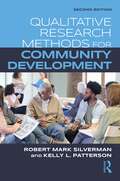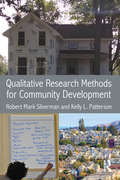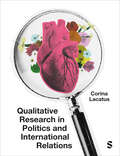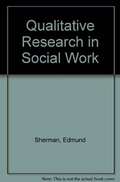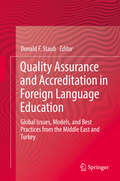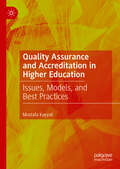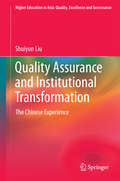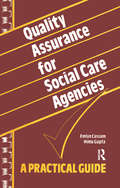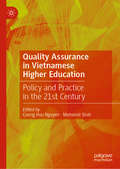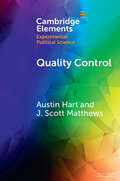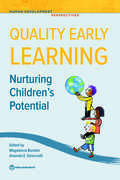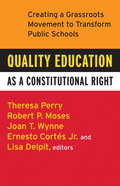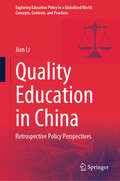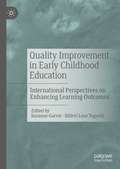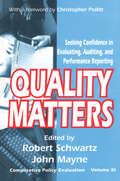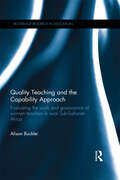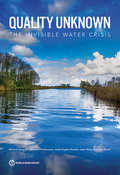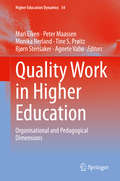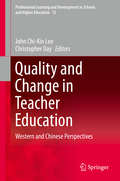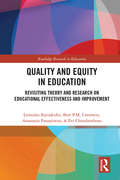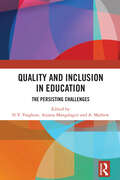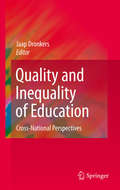- Table View
- List View
Qualitative Research Methods for Community Development
by Robert Mark Silverman Kelly L. PattersonThe second edition of Qualitative Research Methods for Community Development teaches the basic skills, tools, and methods of qualitative research with special attention to the needs of community practitioners. This book teaches students entering planning, community development, nonprofit management, social work, and similar applied fields the core skills necessary to conduct systematic research designed to empower communities and promote social change. Focusing on the basic elements of qualitative research, such as field observation, interviewing, focus groups, and content analysis, this second edition of this book provides an overview of core methods and theoretical underpinnings of successful research. It also includes two new chapters on qualitative data analysis software and techniques for conducting online qualitative interviews and focus groups. From housing, community organizing, neighborhood planning, and urban revitalization, this book gives students the skills they need to undertake their own projects and provides professionals a valuable reference for their future research. This book serves as a primary text for courses in applied qualitative research and as a reference book for professionals and community-based researchers.
Qualitative Research Methods for Community Development
by Robert Mark Silverman Kelly L. PattersonQualitative Research Methods for Community Development teaches the basic skills, tools, and methods of qualitative research with special attention to the needs of community practitioners. This book teaches students entering planning, community development, nonprofit management, social work, and similar applied fields the core skills necessary to conduct systematic research designed to empower communities and promote social change. Focusing on the basic elements of qualitative research, like field observation, interviewing, focus groups, and content analysis, Qualitative Research Methods for Community Development provides an overview of core methods and theoretical underpinnings of successful research. The book provides examples from past research used in transformative community projects across multiple disciplines. From housing, community organizing, neighborhood planning, and urban revitalization, this book gives students the skills they need to undertake their own projects, and provides professionals a valuable reference for their future research. The book serves as a primary text for courses in applied qualitative research, and as a reference book for professionals and community-based researchers. In addition to content detailing core methods used in qualitative research, it includes a chapter which provides guidance for the dissemination of qualitative results to a spectrum of audiences applying qualitative methods to action research and community empowerment.
Qualitative Research Methods for Community Development
by Robert Mark Silverman Kelly PattersonThe second edition of Qualitative Research Methods for Community Development teaches the basic skills, tools, and methods of qualitative research with special attention to the needs of community practitioners. This book teaches students entering planning, community development, nonprofit management, social work, and similar applied fields the core skills necessary to conduct systematic research designed to empower communities and promote social change.Focusing on the basic elements of qualitative research, such as field observation, interviewing, focus groups, and content analysis, this second edition of this book provides an overview of core methods and theoretical underpinnings of successful research. It also includes two new chapters on qualitative data analysis software and techniques for conducting online qualitative interviews and focus groups.From housing, community organizing, neighborhood planning, and urban revitalization, this book gives students the skills they need to undertake their own projects and provides professionals a valuable reference for their future research. This book serves as a primary text for courses in applied qualitative research and as a reference book for professionals and community-based researchers.
Qualitative Research in Politics and International Relations: A practical and pluralist guide
by Corina LacatusThis groundbreaking textbook is the essential introduction to qualitative research for politics and international relations. Presented in a refreshingly accessible manner, this text applies a practical approach to help you learn by doing and will equip you with the tools to get researching. Embrace a pedagogical approach that seamlessly integrates theoretical insights with hands-on guidance, empowering you to navigate the complexities of qualitative research with confidence and clarity. Key Benefits Include: · Practical Approach: bid farewell to abstract learning with practical tools and exercises that instil intuition and proficiency. Step-by-step support for students grappling with the logistical intricacies of research design, data collection, and analysis. · Close Links to the Disciplines: immerse yourself in the latest seminal research and learn how to select robust qualitative designs for your research questions. · Demystify Theory and Methodology: this text addresses the perennial challenge of aligning theory with methodology, providing a cohesive framework for qualitative research. · Expert Guidance: for educators seeking to incorporate this invaluable resource into their curriculum, a complementary online teaching guidebook offers guidance and suggestions on how to truly engage with the material and enrich the learning experience for your students. An essential companion for undergraduate students navigating qualitative methods modules to postgraduate students and researchers shaping their research projects. Corina Lacatus is a Senior Lecturer in Global Governance at the School of Politics and International Relations, Queen Mary University of London.
Qualitative Research in Politics and International Relations: A practical and pluralist guide
by Corina LacatusThis groundbreaking textbook is the essential introduction to qualitative research for politics and international relations. Presented in a refreshingly accessible manner, this text applies a practical approach to help you learn by doing and will equip you with the tools to get researching. Embrace a pedagogical approach that seamlessly integrates theoretical insights with hands-on guidance, empowering you to navigate the complexities of qualitative research with confidence and clarity. Key Benefits Include: · Practical Approach: bid farewell to abstract learning with practical tools and exercises that instil intuition and proficiency. Step-by-step support for students grappling with the logistical intricacies of research design, data collection, and analysis. · Close Links to the Disciplines: immerse yourself in the latest seminal research and learn how to select robust qualitative designs for your research questions. · Demystify Theory and Methodology: this text addresses the perennial challenge of aligning theory with methodology, providing a cohesive framework for qualitative research. · Expert Guidance: for educators seeking to incorporate this invaluable resource into their curriculum, a complementary online teaching guidebook offers guidance and suggestions on how to truly engage with the material and enrich the learning experience for your students. An essential companion for undergraduate students navigating qualitative methods modules to postgraduate students and researchers shaping their research projects. Corina Lacatus is a Senior Lecturer in Global Governance at the School of Politics and International Relations, Queen Mary University of London.
Qualitative Research in Social Work
by William J. Reid Edmund ShermanIn this volume, progressive experts survey recent trends in qualitative study, which relies on small sample groups and interview data to better represent the context and complexity of social work practice. Chapters address different approaches to qualitative inquiry, applications to essential areas of research and practice, integration of qualitative and quantitative methods, and epistemological issues. <p><p> This second edition brings even greater depth and relevance to social work qualitative research, including new material that tackles traditional research concerns, such as data quality, ethics, and epistemological stances, and updated techniques in data collection and analysis. To increase the usefulness for students and researchers, the editors have reorganized the text to present basic principles first and then their applications, and they have increased their focus on ethics, values, and theory. New and revised illustrative studies highlight more than ever the connection between effective research and improved social functioning among individuals and groups. The collection continues to feature scholars and practitioners who have shaped the social work research practice canon for more than twenty years, while also adding the innovative work of up-and-coming talent.
Quality Assurance and Accreditation in Foreign Language Education: Global Issues, Models, and Best Practices from the Middle East and Turkey
by Donald F. StaubGreater student mobility, increasing demand for access to tertiary education, as well as policy changes have spurred rapid expansion of the global higher education sector. However, with increased demand comes considerable variation in the quality of the supply. As higher education is an expensive endeavor for all stakeholders – governments, funders, employers, and families – there are also increasing expectations for accountability and demonstrations of quality. English as a foreign language (EFL) programs, in particular, are under considerable pressure to substantiate their value, resulting in a significant rise in interest around their quality. This volume is the outcome of a May 2018 international conference on quality and specialized accreditation, held in Turkey. The book’s three sections take the reader from the global to the program level, examining trends and best practices in quality assurance and accreditation in EFL programs. The book’s geographic focus is primarily the Middle East and Turkey, yet the issues discussed herein a quite global in nature. This volume will be of interest to educational administrators at the institutional or program level, educational leadership programs focusing on higher education, language teacher preparation programs, and administrators in centralized education systems or accrediting organizations.
Quality Assurance and Accreditation in Higher Education: Issues, Models, and Best Practices
by Mustafa KayyaliThis book examines a wide range of topics within quality assurance at universities in order to present a conceptual, historical, and thematic mapping of academic and practical perspectives. As we navigate the complex tapestry of the twenty-first century, where change is constant, the global higher education landscape is undergoing profound shifts that define its present and signal its future. In this book, the author probes the mechanisms of quality assurance to not only ensure excellence but also resonate as responses to the contemporary landscape shaped by the challenges of globalization, technological advancement, and societal transformation.
Quality Assurance and Institutional Transformation
by Shuiyun LiuThis book illustrates the higher education quality assurance system and its impact on institutional transformation in China. It starts by describing the higher education system in China and its quality assessment schemes. It discusses in detail the Quality Assessment of Undergraduate Education (QAUE) and the Subject Evaluation, two of the most influential external quality assessment schemes, which are conducted on the institutional and subject levels respectively. In the second part of this book, QAUE is taken as an example for the impact analysis. Using case studies, it explores the impact of the QAUE on various dimensions of quality provisions in universities with different statuses and presents the views of various stakeholders. Based on the empirical findings from the Chinese schemes and the theories on organizational change and the mechanism of external quality assessment, it proposes a model to describe how quality assessment interacts with the evaluated universities and causes them to change.
Quality Assurance for Social Care Agencies: A Practical Guide
by Emlyn Cassam Himu GuptaQuality Assurance for Social Care Agencies is specifically designed to enable you to set up a Quality Assurance system within a social services setting. Including practical checklists, it covers all aspects of Quality Assurance - from what is meant by Quality Assurance and how to implement it to how to monitor and maintain quality control. Examples and details of experiences are included to help you get it right first time.
Quality Assurance in Vietnamese Higher Education: Policy and Practice in the 21st Century
by Mahsood Shah Cuong Huu NguyenThis book provides a comprehensive overview of quality assurance in Vietnamese higher education under the centralised management of the government after 15 years of development. By implementing quality assurance and accreditation mechanisms, the Vietnamese government expected to be able to control and improve the quality of the higher education system. The editors and contributors therefore examine and analyse policies and practices related to the establishment and development of Vietnam's quality assurance system. Amongst other things, the chapters investigate drivers of quality assurance, stakeholders engaged in quality assurance and the future of quality assurance in Vietnamese higher education in benchmarking with other quality assurance systems in the region and across the world. This book will be of interest and value to students and scholars of Vietnamese higher education, as well as quality assurance in higher education more generally, but particularly in developing nations.
Quality Control: Experiments on the Microfoundations of Retrospective Voting (Elements in Experimental Political Science)
by Austin Ray Hart J Scott MatthewsConventional models of voting behavior depict individuals who judge governments for how the world unfolds during their time in office. This phenomenon of retrospective voting requires that individuals integrate and appraise streams of performance information over time. Yet past experimental studies short-circuit this 'integration-appraisal' process. In this Element, we develop a new framework for studying retrospective voting and present eleven experiments building on that framework. Notably, when we allow integration and appraisal to unfold freely, we find little support for models of 'blind retrospection.' Although we observe clear recency bias, we find respondents who are quick to appraise and who make reasonable use of information cues. Critically, they regularly employ benchmarking strategies to manage complex, variable, and even confounded streams of performance information. The results highlight the importance of centering the integration-appraisal challenge in both theoretical models and experimental designs and begin to uncover the cognitive foundations of retrospective voting.
Quality Early Learning: Nurturing Children's Potential (Human Development Perspectives)
by Magdalena Bendini and Amanda E. DevercelliIn this volume, leading researchers and implementation experts from an array of disciplines provide evidence-based, cost-effective, and actionable strategies for delivering quality early childhood education (ECE) at scale in low- and middle-income countries (LMICS).Over the past decade, neuroscientists, developmental and cognitive psychologists, economists, and education researchers have amassed evidence to inform ECE program design. Yet much of this evidence has not been readily accessible to policymakers and practitioners, and potential synergies from cross-disciplinary considerations have not been realized.Quality Early Learning: Nurturing Children’s Potential synthesizes the evidence across disciplines and charts a forward course for quality ECE. The volume includes Overview, From Evidence to Effective Policies: How to Invest in Early Childhood Education to Nurture Children’s Potential, by Magdalena Bendini, Amanda E. Devercelli, Elaine Ding, Melissa Kelly, and Adelle Pushparatnam Chapter 1, Learning in the Early Years, by Elizabeth Spelke and Kristin Shutts Chapter 2, Pedagogy and Curricula Content: Building Foundational Skills and Knowledge, by David Whitebread and Yasmin Sitabkhan Chapter 3, Building an Effective Early Childhood Education Workforce, by Nirmala Rao, Emma Pearson, Benjamin Piper, and Carrie Lau Chapter 4, Creating Early Childhood Education Environments That Promote Early Learning, by Cynthia Adlerstein and Alejandra Cortázar Chapter 5, The Role of Management, Leadership, and Monitoring in Producing Quality Learning Outcomes in Early Childhood Education, by Iram Siraj, Violeta Arancibia, and Juan Barón Chapter 6, Toward Quality Early Learning: Systems for Success, by Sharon Lynn Kagan and Caitlin M. Dermody In the volume, the authors provide the latest evidence on how young children learn most effectively and how ECE programs can foster children’s natural ability and motivation to learn. It offers guidance for policy makers on policy design and implementation including what elements of ECE to prioritize in resource- and capacity-constrained settings in LMICs.
Quality Education as a Constitutional Right
by Lisa Delpit Theresa Perry Joan T. Wynne Robert P. Moses Ernesto CortesIn 2005, famed civil rights leader and education activist Robert Moses invited one hundred prominent African American and Latino intellectuals and activists to meet to discuss a proposal for a campaign to guarantee a quality education for all children as a constitutional right--a movement that would "transform current approaches to educational inequity, all of which have failed miserably to yield results for our children." The response was passionate, and the meeting launched a movement. This book--emerging directly from that effort--reports on what has happened since and calls for a new scale of organizing, legal initiatives, and public definitions of what a quality education is. Essays include · Robert Moses's historically rooted call for citizens, especially young people, to make the demand for quality education · Ernesto Cortés's view from decades of work organizing Latino communities in Texas · Charles Payne's interview with students from the Baltimore Algebra Project, who organized to make historic demands on their district · Legal scholar Imani Perry's nuanced analysis of the prospects of making a case for quality education as a right guaranteed by the Constitution · Perspectives from scholars Lisa Delpit and Joan T. Wynne, and by teachers Alicia Caroll and Kim Parker, who provide examples of what quality education is, describing its goal, and how to guide practice in the meantime
Quality Education in China: Retrospective Policy Perspectives (Exploring Education Policy in a Globalized World: Concepts, Contexts, and Practices)
by Jian LiThis book explores quality education in China from a retrospective policy perspective. It approaches the topic of quality education from multiple dimensions, such as the historical development of quality education policy, the quality education policy model, the assessment of quality education policy, the resource allocation of quality education policy, and quality education and personnel cultivation in China. This book highlights that the all-round implementation of quality education allows basic education to return to its original nature, and advocates transferring basic education from 'exam-oriented education' to 'quality education' in China.
Quality Improvement in Early Childhood Education: International Perspectives on Enhancing Learning Outcomes
by Susanne Garvis Hillevi Lenz TaguchiThis book explores international perspectives on quality improvement within the field of early childhood education and care. Many countries and governments are focusing on preschool quality as a way to improve entrenched inequalities and reduce social disadvantage and segregation: this book draws together various global case studies to showcase how different countries tackle aspects of quality improvement. The concept of quality is understood in different ways both culturally and contextually, and the implementation of measures to improve quality will differ from country to country. The book draws together case studies from numerous contexts to showcase various ways of working with aspects of quality improvement. Sharing important insights into policy and practice, this book guides a shared understanding of the complex nature of quality improvement within early childhood education and care.
Quality Matters: Seeking Confidence in Evaluating, Auditing, and Performance Reporting (Comparative Policy Evaluation Ser. #Vol. 11)
by John Winston MayneInformation--regular, systematic, reliable--is the life-blood of democracy and the fuel of effective management. Surely today there is no problem with information, for this is the age of information overload. It pours onto our computer screens and out of our printers. Indeed, many governments claim, often with some justification, to be more open and transparent than ever before. But what if the life-blood is contaminated, or the fuel polluted? Then the body politic sickens and the engine of public management runs rough. It is the vital issue of the quality of the information we receive that this book addresses. Quality Matters compares approaches across different jurisdictional settings and across three different types of information evaluation. The chapters describe and analyze quality assurance in a number of countries and within a variety of international organizations. These have been selected either because they are widely considered to be leaders in evaluating information or because they have experience with assuring quality information that can instruct others. Contributors are from Australia, Canada, the European Union, France, the Netherlands, New Zealand, Sweden, Switzerland, United Kingdom, United States, and the World Bank. This pioneering study analyzes practices for assuring the quality of evaluation, performance auditing, and reporting in the face of political, organizational, and technical obstacles. A final chapter addresses the extent to which quality assurance systems become bothersome rituals or remain meaningful mechanisms to ensure quality control. This well-structured volume will be of particular interest to policymakers and adds much to the literature on program evaluation and performance auditing.
Quality Standards, Value Chains, and International Development
by Johan SwinnenOver the past decades, the world has witnessed an unprecedented growth in global value chains, propelled by increasingly demanding quality standards. These trends lead to concerns about the impact of value chains on development and poverty and about the possible protectionist nature of quality standards in rich countries. This book offers the first integrated theoretical analysis of the economic and political factors which determine the level of quality standards, as well as their economic effects along the value chain. Using realistic assumptions motivated by empirical research, the theoretical framework in this book makes it possible to study the efficiency effects as well as the distributional consequences of one of the most striking evolutions affecting global trade and development today.
Quality Teaching and the Capability Approach: Evaluating the work and governance of women teachers in rural Sub-Saharan Africa (Routledge Research in Education)
by Alison BucklerThis book provides an analytical exploration of the condition of teachers working in expanding school systems across the world, with a particular focus on the lives of women teachers in rural Sub-Saharan Africa. Drawing from award-winning research, it looks beyond the official portrayals of teachers’ lives in order to better understand the reality of the contexts in which teachers live and work. Positioning Amartya Sen’s capability approach at the heart of the study, each chapter considers documentary evidence alongside ethnographic research from rural, remote and under-resourced schools in Ghana, Nigeria, Kenya, South Africa and Sudan. Interweaving rich narratives from teachers in a variety of contexts, the book proposes a concept of professional capability and examines female teachers’ agency to pursue and achieve this in their classrooms. This key examination challenges existing notions of ‘quality education’ and reveals insights into the broader purpose of schooling for rural communities. Quality Teaching and the Capability Approach will be of value to researchers, academics and postgraduate students in education, particularly those concerned with gender, development and teaching, as well as educationalists and policy makers concerned with education and development.
Quality Unknown: The Invisible Water Crisis
by Richard Damania Sébastien Desbureaux Aude-Sophie Rodella RussWater quantity—too much in the case of floods, or too little in the case of droughts—grabs public attention and the media spotlight. Water quality—being predominantly invisible and hard to detect—goes largely unnoticed. Quality Unknown: The Invisible Water Crisis presents new evidence and new data that call urgent attention to the hidden dangers lying beneath water’s surface. It shows how poor water quality stalls economic progress, stymies human potential, and reduces food production. Quality Unknown examines the effects of water quality on economic growth and finds upstream pollution lowers growth in downstream regions. It reveals that some of the most ubiquitous contaminants in water, such as nitrates and salt, have impacts that are larger, deeper, and wider than has been acknowledged. And it traces the damage to crop yields and the stark implications for food security in affected regions. An important step toward tackling the world’s water quality challenge is recognizing its scale. The world needs reliable, accurate, and comprehensive information so that policy makers can have new insights, decision making can be evidence based, and citizens can call for action. The report calls for a paradigm shift that emphasizes safer, and often more cost-effective remedies that prevent pollution by combining smarter policies with newer technologies. A key message of Quality Unknown is that such solutions exist and change is possible.
Quality Work in Higher Education: Organisational and Pedagogical Dimensions (Higher Education Dynamics #54)
by Peter Maassen Bjørn Stensaker Monika Nerland Mari Elken Tine S. Prøitz Agnete VabøThis book focuses on quality work in higher education, and examines the relationship between the organizational and pedagogical dimensions of quality work in higher education. Bringing together different disciplinary traditions, including educational science, sociology, and organisational studies, it addresses the following principal research question: How is quality work carried out in higher education?The book addresses a wide variety of academic, administrative and leadership practices that are involved in quality work in higher education institutions. The chapters in this book examine core issues crucial in the design and content of study programs, such as modes of teaching, learning and curricula design, as well as institutional practices regarding assessment and quality enhancement. The introductory and concluding chapter present an overarching focus on quality work as a lens to analyse intentional activities within higher education institutions directed at how study programmes and courses are designed, governed, and operated.
Quality and Change in Teacher Education
by John Chi-Kin Lee Christopher DayHow teachers may be better educated for a changing global world is a challenge that faces many systems of education worldwide. This book addresses key issues of quality and change in teacher education in the context of the new public management achievement agendas which are permeating teacher education structures, cultures and programmes and the work of teacher educators internationally. Graduate schools of education in the United States and the UK, for example, are making fundamental changes in the structures, courses, programs and faculties that prepare beginning teachers each year. Drawing upon examples from the United States, United Kingdom, China, Hong Kong, Australia and elsewhere, its authors provide a unique critical overview of emerging themes and challenges of raising the quality of teaching and the quality of student learning outcomes. They suggest possible ways forward for teachers, teacher educators, researchers and policy-makers as they seek to raise the quality of teaching and student outcomes whilst sustaining their moral purposes and values of equity, inclusion and social justice. Taken together, the chapters contain informed, critical discussions of "normal education" and "teacher education" of "professional standards", "4+2/+1" post-degree training, "PGDE versus BEd", integration of subject specializations and professional education. Each one provides new visions of the teacher as a professional and to cultivate high quality teachers in the West and the Greater China region. For all those interested in issues of quality, change and forward movement in teacher education in contexts of policy led reform, this is a must read.
Quality and Equity in Education: Revisiting Theory and Research on Educational Effectiveness and Improvement (Routledge Research in Education)
by Leonidas Kyriakides Evi Charalambous Bert P.M. Creemers Anastasia PanayiotouQuality and Equity in Education draws attention to the importance of developing and testing theories of educational effectiveness and using these theories for improvement purposes. It makes a major contribution to knowledge and theory building in research on promoting quality and equity in education. The book presents an improved version of the dynamic model of educational effectiveness based on the empirical data emerged from studies testing its validity, claiming that the proposed theory can be used for establishing links between educational effectiveness research and school improvement. Towards that end, the book presents the Dynamic Approach to teacher and school improvement, demonstrating its impact on quality and equity in education. The book not only proposes an agenda for further research on developing and testing the dynamic theory of educational effectiveness but also refers to research methods that can be used to test the assumptions of this theory and search for relevant cause and effect relations. The agenda also refers to the need of identifying the conditions under which the dynamic approach to teacher and school improvement can have an effect on student learning outcomes. This book will be of great interest for academics, researchers and postgraduate students working in education research and the area of quality and equity in education. It will also be of interest to policymakers, school advisors and other stakeholders in education.
Quality and Inclusion in Education: The Persisting Challenges
by N. V. Varghese Anjana Mangalagiri A. MathewThis book calls for an equitable and qualitative access to education for all. It proposes paradigms of educational governance that are based on coalition building between key stakeholders, are grounded in local and cultural contexts, sensitive to the language needs of communities. It underlines the significance of gender sensitive and inclusive approaches that ensure equity for marginalized children and minorities. Based on research-based studies, the volume focuses on equity, quality, and learning — covering a broad spectrum, from school to higher, to adult education. It discusses the multiple learner deprivations amongst the marginalized communities and the severe impact of events such as pandemics that exacerbate learner inequities and the recent developments in India under the National Education Policy 2020. It also presents research-based country experiences in the Asian (India, Bangladesh, China) and African (Ghana, South Africa) contexts, showing how external influences on the changing priorities in policy perspectives cut across developing countries. Compiled in honour of Professor R. Govinda, this volume of insightful articles will be of interest to students and researchers of educational policy and studies, sociology of education, equity and human rights. It will also be useful for decision makers and think tanks.
Quality and Inequality of Education
by Jaap DronkersThis cogent analysis of data on education and society from a variety of sources sets out to provide answers to scientific and policy questions on the quality of education and the way it relates to various forms of inequality in modern societies, particularly in Europe. The authors examine not only the well known cross-national PISA datasets, but also the European Social Survey and TIMSS, going further than many researchers by folding into their analyses economic, legal and historical factors. Most research up to now using the PISA data is restricted to educational research. Interesting as that educational question is, the chapters here use the PISA, and other data, to explore more profoundly the relationship between education and the various forms of inequality in European and other modern societies. The work comes from two different perspectives: one that looks at how the different characteristics of societies, their economies, and their educational systems influence the average educational achievements of specific groups of pupils, such as immigrants, in those societies; and a second, which explores how, and in what degree, the characteristics of schools, educational systems and labour-markets either hardens or softens differences in the educational outcomes of various groups of pupils. With a special feature of the book being its emphasis on comparing Asian and European countries, and with the content free of the political constraints that can often attend studies of these datasets, this book will be an vital resource for educationalists and policy-makers alike.
